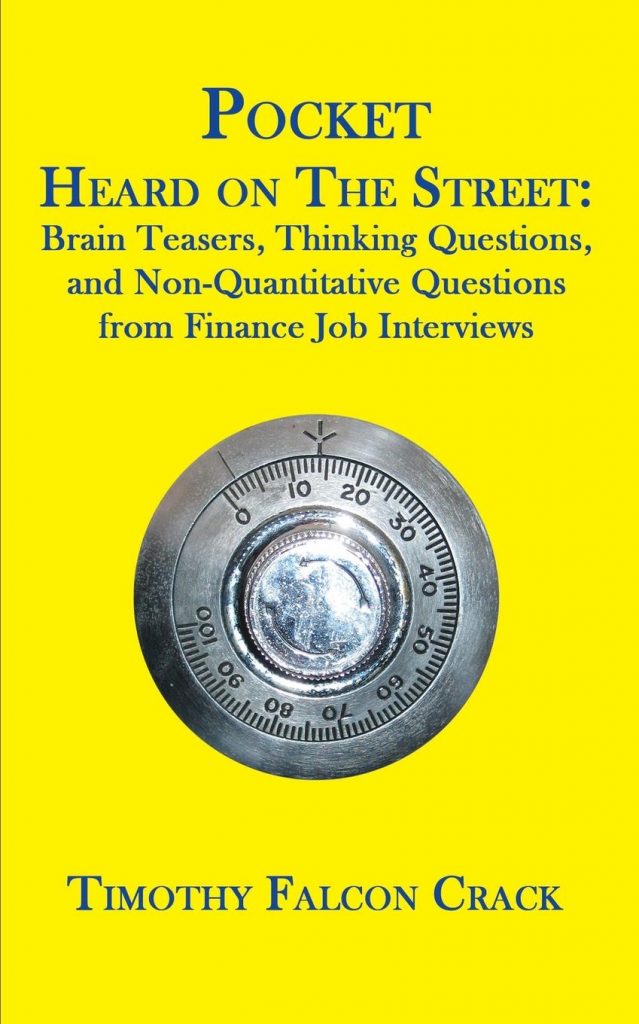Quantitative finance is a tricky business to get into. Applying for a job there requires months of practice and preparation work in the field of Probability Theory, Stochastic Calculus and some experience with C++ programming. A number of Quantitative analyst job interviews require excellent mathematics knowledge and use logic brain teasers in combination with derivations of the Black-Scholes equation or Ito’s Lemma.
This is a lot for a potential applicant to go through and learn on their own, which is why a list of the essential four books which will help you ace the interview is given below. Reading these books thoroughly can prepare and provide you with all the vital insight required to be an expert and excel in Quantitative analyst interviews.
1. Heard on The Street: Quantitative Questions from Wall Street Job Interviews by Timothy Falcon Crack

This book is considered to be one of the classics when it comes to preparing for a Quantitative analyst job. ‘Heard on the Street’ consists of all real questions asked during an interview in Wall Street and several of these questions you will be asked in your interview will be either modified or borrowed from the book. In several cases, the interviewer intentionally asks questions from the book to see if the interviewee has done the required ‘homework.’ This book deals with five main parts that are incredibly important for an aspiring quant, namely they are Derivatives Questions, Quantitative/logical Questions, Financial Economics Questions, Non-Quantitative Questions, and Statistics Questions. Although it is not an easy book to finish because of the challenging quantitative and statistics questions, you should ensure to give it an in-depth read before appearing for an interview.
2. Frequently Asked Questions in Quantitative Finance by Paul Wilmott
The author of this book is known in the industry for his enticing and stimulating writing with a tinge of humor. His books like ‘Paul Wilmott on Quantitative Finance’ are considered to be some of the best reads before appearing for an interview in the post of a quant. However, you might now question how ‘Frequently Asked Questions in Quantitative finance’ will help if you already have the other books, the main advantage of this book is that it offers both the long and short versions of an answer to a specific ‘FAQ.’ This not only makes it easier to read but also saves time as it can be read rapidly before an interview to gain insight on certain topics that can be difficult to remember.
3. Quant Job Interview Questions And Answers by Mark S. Joshi, Nick Denson, Andrew Downes

Mark Joshi had written an article about acquiring a Quantitative analyst job. It further explained what an interviewee should be expecting before, during and after the interview. This book is an elaboration of the same article with the addition of more discussions on ‘soft’ questions and technical questions. It further explains the process of the interview, probability, options pricing, rates, C++, numerical methods, general mathematics and brainteasers. One other advantage of this book is that it contains various questions that are not seen in any other book and is much more up to date. This book was Mark’s first attempt at publishing a book and experimenting which worked really well for him. If you are looking for a book that provides help with a number of technical questions and provides more insight into what the job or the interview will be like, this is one book you should not miss out on.
4. A Practical Guide To Quantitative Finance Interviews by Xinfeng Zhou
Much like the prior author, this book is also one of the self-published works by Xinfeng Zhou. Although it is criticized for its less professional formatting and editing, it contains 200 amazing questions on topics which a Quantitative analyst fluent with, in an interview. Along with that, it covers a wide range of topics like probability, linear algebra/calculus, stochastic processes, combinatorics, finance/options, numerical methods and different varieties of brainteasers. Even after all your preparation with the other books, if you think you would require more practice, Zhou’s book will most definitely provide you with it.











